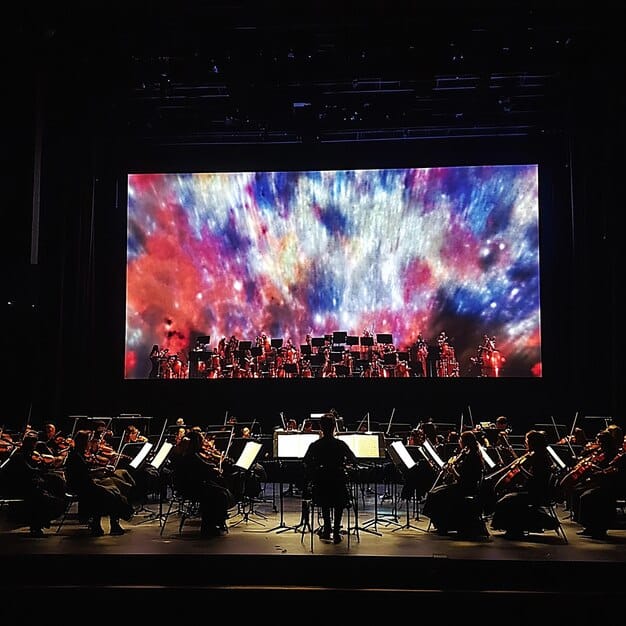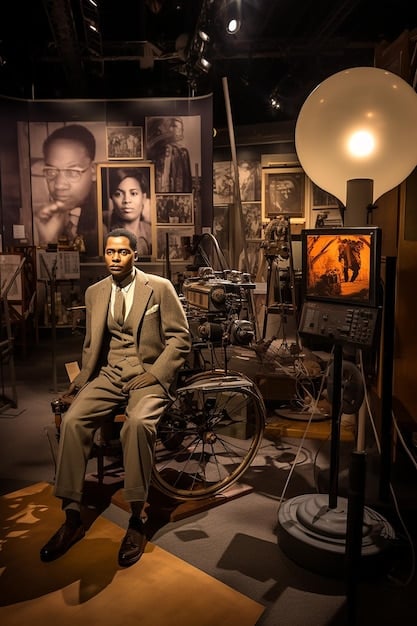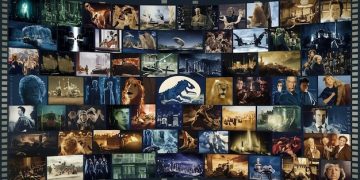Discover How International Film Scores Enhance the Cinematic Experience

International film scores play a crucial role; learn how music elevates storytelling, enhances emotional impact, and leaves a lasting impression on viewers immersing themselves in international cinema.
Have you ever wondered how music can make a movie scene unforgettable? International film scores: how music enhances the cinematic experience goes beyond mere background noise. It is a critical element that can dictate the emotional tone and storytelling power of a film. By understanding the nuances of film scoring, you gain a deeper appreciation for the art of cinema.
From classic Hollywood scores to the vibrant sounds of Bollywood, music transcends cultural boundaries and enhances the emotional impact of storytelling. Let’s explore how different elements of international film scores: how music enhances the cinematic experience contribute to the immersive experience.
The Role of Music in International Film Scores: How Music Enhances the Cinematic Experience
Film scores are integral to the cinematic experience. They shape our emotional engagement and deepen our connection with the narrative. Let’s explore the purpose and evolution of film music around the globe.
Setting the Emotional Tone
Music sets the emotional tone of a scene, dictating how viewers feel. A well-composed score accentuates joy, sorrow, tension, or excitement, immersing the audience in the emotional landscape of the movie.
Enhancing Narrative Depth
Beyond emotions, music adds layers of meaning and context to the story. It provides insights into characters’ feelings and foreshadows events, enriching the narrative.
- Supporting Visuals: Music complements visuals, reinforcing emotions and creating a cohesive viewing experience.
- Building Suspense: Suspenseful music heightens anticipation and keeps viewers on the edge of their seats.
- Defining Character Themes: Specific melodies or musical motifs represent characters, adding depth to their portrayal.
In conclusion, music doesn’t simply accompany films. It shapes our entire experience, directing our feelings and enhancing our understanding of the story. International film scores: how music enhances the cinematic experience creates a rich, immersive environment, elevating the art of storytelling and leaving a lasting impact.

Exploring Different Genres in International Film Scores: How Music Enhances the Cinematic Experience
Different film genres require diverse musical styles. From the soaring orchestrations of epic dramas to the pulsating beats of action films, each genre leverages music uniquely, and many times blending them.
Orchestral Scores in Epic Films
Epic films often use grand orchestral scores to enhance their larger-than-life narratives. Think of “Lawrence of Arabia” or “Gladiator,” where music evokes a sense of grandeur and historical weight.
Electronic Music in Sci-Fi Films
Science fiction films often use electronic music to create futuristic and otherworldly atmospheres. Scores like those in “Blade Runner” or “Arrival” add to the sense of technological advancement and alien landscapes. How international film scores: how music enhances the cinematic experience is felt depends on the viewer’s preferences.
- Action: High-energy music with rhythmic intensity.
- Horror: Dissonant sounds and suspenseful cues.
- Romance: Melodic and emotive compositions.
Different genres employ music in distinct ways to amplify their themes and narratives. Whether it’s the tension of a thriller or the joy of a comedy, music is essential to evoke the emotions and amplify the experience for the audience. By understanding these differences, viewers can appreciate how international film scores: how music enhances the cinematic experience enhances their engagement with various film genres.
Iconic International Film Scores and Composers
Certain film scores and composers have become synonymous with cinematic excellence, influencing generations of filmmakers and musicians, thus establishing expectations of how international film scores: how music enhances the cinematic experience should feel.
Ennio Morricone – The Maestro of Westerns
Ennio Morricone’s scores for Sergio Leone’s “Dollars Trilogy” redefined Western music. His use of unorthodox instruments and memorable melodies created a unique and timeless sound. It has a lasting impact on international film scores: how music enhances the cinematic experience.
A.R. Rahman – The Sound of Bollywood
A.R. Rahman revolutionized Indian film music with his innovative blend of traditional Indian sounds and modern electronic elements. His score for “Slumdog Millionaire” brought his music to a global audience.
- Bernard Herrmann: Known for his suspenseful scores in Hitchcock films.
- Hans Zimmer: Celebrated for his powerful and epic scores in contemporary blockbusters.
- Joe Hisaishi: Renowned for his whimsical and heartwarming scores in Studio Ghibli films.
In summary, these composers and their iconic scores have shaped our understanding of how music enriches storytelling. Their contributions have not only enhanced specific films but have also redefined the art of film scoring, leaving an indelible mark on the industry. International film scores: how music enhances the cinematic experience is a tapestry woven by many masters.

Cultural Influences on International Film Scores: How Music Enhances the Cinematic Experience
Cultural elements significantly shape film scores, adapting or celebrating unique musical traditions and the artistic needs of the movie. These regional music and styles add authenticity and uniqueness to film scores.
Asian Cinema – Traditional Instruments and Melodies
Films from China, Japan, and Korea often incorporate traditional instruments and melodies. These elements reflect cultural heritage and enrich the storytelling, like the use of shamisen in Japanese samurai films.
Latin American Cinema – Rhythmic and Passionate Scores
Latin American films often feature rhythmic and passionate scores that reflect the region’s vibrant musical traditions. Music from genres like salsa, tango, and bossa nova adds depth to the storytelling.
- European Cinema: Diverse musical styles that reflect regional traditions.
- African Cinema: Use of indigenous instruments and vocal traditions.
- Middle Eastern Cinema: Fusion of traditional and modern sounds.
In essence, cultural influences on film scores significantly enhance the cinematic experience. The use of native instruments, melodies, and rhythms not only adds authenticity but also provides a deeper emotional and cultural context for viewers. How international film scores: how music enhances the cinematic experience affects viewers is deeply connected to their personal experiences and cultural background.
The Future of International Film Scores: How Music Enhances the Cinematic Experience
The future of film scoring is set to be influenced by technological advancements and innovative composing, thus shaping how international film scores: how music enhances the cinematic experience are created.
The Integration of Technology
Advanced software and digital instruments are transforming film scoring. Composers now have access to a vast array of tools and sounds, expanding their creative possibilities.
New Compositional Techniques
Composers are experimenting with new compositional techniques, blending electronic and orchestral elements. This fusion gives rise to unique and innovative scores that push the boundaries of film music.
- Interactive Scores: Music that adapts to viewer choices in interactive films.
- Virtual Reality Integration: Immersive scores for VR cinematic experiences.
- AI-Assisted Composition: AI tools that aid composers in creating complex musical arrangements.
In conclusion, the future of film scoring is promising, with a blend of technology and creativity driving new possibilities. These advancements will not only enhance the quality of film music but also create more immersive and engaging cinematic experiences for audiences. The ways in which we experience international film scores: how music enhances the cinematic experience will continue to transform.
| Key Point | Brief Description |
|---|---|
| 🎵 Emotional Tone | Music sets the emotional landscape of scenes. |
| 🌍 Cultural Impact | Regional styles add authenticity to film scores. |
| 🚀 Tech Integration | Advanced tech expands creative possibilities. |
| 🏆 Iconic Composers | Morricone, Rahman, and Zimmer revolutionized sounds. |
Frequently Asked Questions
International film scores are essential because they enhance emotional engagement, deepen narrative impact, and add cultural context to cinematic experiences. They’re crucial element of how music enhances the cinematic experience.
Music plays a pivotal role in setting the emotional tone of a movie. It evokes feelings such as joy, sorrow, suspense, or excitement, guiding the audience’s emotional journey.
Composers integrate cultural elements by using traditional instruments, melodies, and rhythms that reflect the film’s cultural setting, adding authenticity and depth to the score. Considering international film scores: how music enhances the cinematic experience often involves blending diverse cultural elements.
Examples include Ennio Morricone’s “The Good, the Bad and the Ugly,” A.R. Rahman’s “Slumdog Millionaire,” and Bernard Herrmann’s scores for Alfred Hitchcock films such as “Psycho.”
Technology will enable composers to access advanced tools, integrate AI for composition, and create immersive scores for VR experiences, pushing the boundaries of how international film scores: how music enhances the cinematic experience will be felt.
Conclusion
In conclusion, international film scores play a profound role in enriching the cinematic experience. They not only enhance emotional engagement and narrative depth but also add cultural authenticity. As technology evolves, the future of international film scores: how music enhances the cinematic experience promises even more immersive and innovative ways to tell stories.





